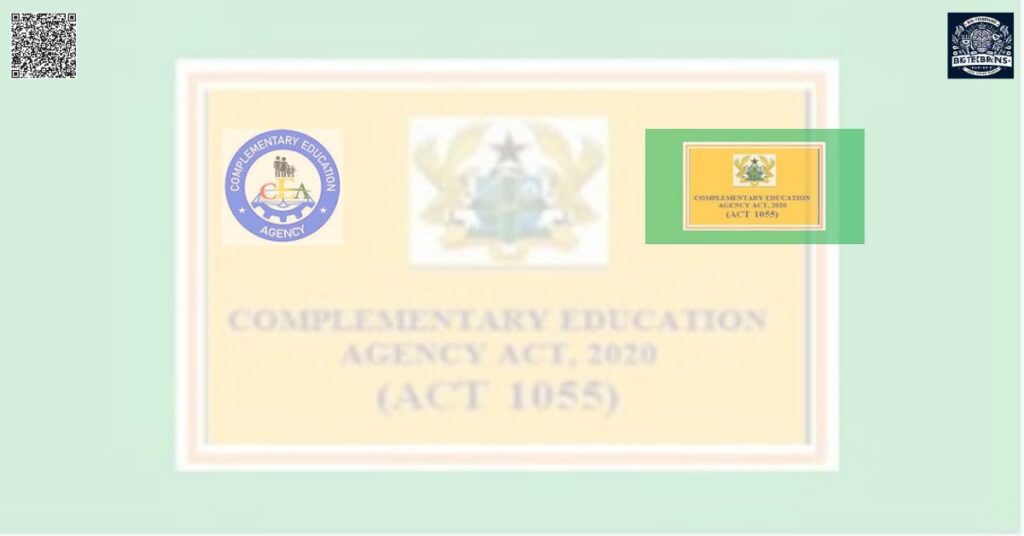Excerpt
The Complementary Education Agency (CEA) is a pivotal institution within Ghana’s educational framework, dedicated to providing alternative learning opportunities for individuals outside the formal education system. Established under the Complementary Education Agency Act, 2020 (Act 1055), the CEA has evolved to address the diverse educational needs of Ghanaians, ensuring inclusivity and accessibility in education.
Historical Background
The CEA was instituted to replace the Non-Formal Education Division (NFED) of the Ministry of Education. This transition marked a significant shift from traditional non-formal education to a more comprehensive complementary education model, reflecting the myriad changes and innovations in the field. The agency’s establishment was formalized with the passage of the Complementary Education Agency Bill in October 2020, leading to the enactment of Act 1055 in December 2020.
Constitutional Role and Mandate
The primary mandate of the CEA is to oversee the provision and administration of quality complementary education in Ghana. This includes offering educational programs outside the formal system to equip individuals with the requisite knowledge, skills, and attitudes necessary for personal, community, and national development. The agency aims to make complementary education accessible, equitable, and inclusive by creating quality alternative learning opportunities.
Organizational Structure
The CEA operates under the leadership of an Executive Director, supported by two Deputy Executive Directors responsible for Operations and Support Services. The agency has established functional offices across all sixteen regions and 216 metropolitan, municipal, and district areas in Ghana. These offices are managed by Acting Directors, with Programme Officers and Programme Assistants providing additional support to implement the agency’s mandate effectively.
Leadership and Ranks
The leadership hierarchy of the CEA comprises the Executive Director at the helm, followed by the two Deputy Executive Directors. At the regional and district levels, Acting Directors oversee operations, supported by Programme Officers and Programme Assistants. This structure ensures efficient management and execution of the agency’s programs nationwide.
Mode of Appointment and Recruitment
Appointments within the CEA are guided by public service regulations and the agency’s internal policies. The Executive Director and Deputy Executive Directors are appointed based on their qualifications and experience in education and management. Regional and district staff, including Acting Directors, Programme Officers, and Programme Assistants, are recruited through a competitive process to ensure the selection of qualified personnel committed to the agency’s mission.
Collaborations and Partnerships
The CEA collaborates with various governmental and non-governmental organizations to fulfill its mandate. Notably, it works closely with the Ghana Education Service (GES) to implement programs targeting out-of-school children. Additionally, partnerships with organizations like Luminous Ghana have been established to enhance complementary basic education, particularly in regions with high rates of out-of-school children.
Constitutional Reforms
- The transformation from the NFED to the CEA was a significant constitutional reform aimed at broadening the scope of non-formal education in Ghana. This reform was encapsulated in the Complementary Education Agency Act, 2020 (Act 1055), which provided a legal framework for the agency’s operations and expanded its mandate to include various forms of complementary education.
Achievements
Since its inception, the CEA has made significant strides in promoting complementary education in Ghana. The agency has implemented the Complementary Basic Education program for 5,000 out-of-school children across six districts in four regions. Furthermore, in collaboration with the Ghana Education Service, the CEA is involved in the Ghana Education Outcome Project (GEOP), aiming to reach an additional 70,000 out-of-school children.
Reference
- https://www.nfed.gov.gh/wp-content/uploads/2021/09/CEA-Act-Editted.pdf
- https://cea.gov.gh/directors-welcome-message/
- https://cea.gov.gh/
- https://cea.gov.gh/contacts/?
- https://www.graphic.com.gh/news/general-news/ghana-news-providing-alternative-learning-opportunities-complementary-education-agency-to-leverage-collaboration.html
- https://newsghana.com.gh/cea-adopts-strategies-for-implementing-complementary-education/
- https://gna.org.gh/2023/03/complementary-education-agency-adopts-strategies-for-implementing-complementary-education/
- https://www.gbcghanaonline.com/news/education/complementary-education-agency-bill-2019-passed/2020/
- https://www.modernghana.com/news/961568/complementary-education-agency-a-social-insurance.html
- https://geshub.org/the-agencies-of-the-ministry-of-education/
Contact Information
For more information or inquiries, the Complementary Education Agency can be reached at:
- Headquarters Postal Address: Complementary Education Agency, Ministry Of Education, P.O. Box M 45, Ghana Literacy House, Accra, Ghana.
- Digital Address: GA-0169970
- Contact Numbers: 0303944824/6
- Email Address: info@cea.gov.gh
